|
|
|
Sort Order |
|
|
|
Items / Page
|
|
|
|
|
|
|
| Srl | Item |
| 1 |
ID:
104114
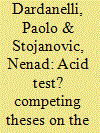

|
|
|
|
|
| Publication |
2011.
|
| Summary/Abstract |
This article deals with the connection between nationality and democracy and explores the role Switzerland plays in the scholarly debate on this question. It identifies three main theses - liberal-nationalist, liberal-multinationalist and liberal-postnationalist - and shows that each of them uses the Swiss case to claim empirical support. It then analyses the connections between nationality and democracy in Switzerland and demonstrates that the country is neither multinational nor postnational, but is best characterised as a mononational state. These findings expose the fallacy of using Switzerland to claim support for either the multinational or the postnational thesis and call for a reconsideration of them. Additionally, they show that "civic nationalism" and "civic republicanism" can be conflated and that a predominantly civic nation is viable and sustainable and is not necessarily an ethnic nation in disguise. The Swiss case thus provides qualified empirical support for the liberal-nationalist thesis.
|
|
|
|
|
|
|
|
|
|
|
|
|
|
|
|
| 2 |
ID:
185749
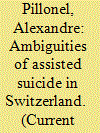

|
|
|
|
|
| Summary/Abstract |
This article aims to highlight the particularity of assisted suicide in Switzerland. Compared with other contemporary forms of dying around the world, which are mainly medicalized, the implementation of assisted suicide in Switzerland is carried out by volunteer associations. The political culture pertaining to assisted suicide reflects the reluctance of medicine to recognize the practice. But its legitimacy is not only a question of justice and rights. It is based on a process of social recognition, advanced by a citizen’s movement, and debated in the public sphere. Through the history of one particular francophone association for the right to die with dignity, the article examines the Swiss way of regulating this manner of dying.
|
|
|
|
|
|
|
|
|
|
|
|
|
|
|
|
| 3 |
ID:
114437
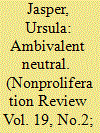

|
|
|
|
|
| Publication |
2012.
|
| Summary/Abstract |
Traditional analyses of Switzerland's nuclear weapons program often explain both its beginning and its end by merely subsuming it under the broad logic of security calculations: the country originally developed an interest in nuclear weapons due to its precarious security environment after the end of World War II; it ended its nuclear ambitions roughly two decades later when it felt less threatened by external powers. Yet this depiction of the Swiss case brushes aside the historical political context in which Switzerland's nuclear decision-making was embedded. Drawing upon studies in sociology and political theory, this article argues that understanding the Swiss debate on nuclear weapons is possible only if we manage to comprehend the significant political and cultural changes that took place within Swiss society. These changes deeply affected the country's defense and foreign policy conceptions and also altered prevalent notions of neutrality, thereby ultimately foreclosing the nuclear option. In more abstract theoretical terms the article moreover suggests that we need to overcome depictions of objectively given threats or predetermined interests and develop analytical tools that help us disentangle the complex, non-linear ways in which threat perceptions, identities, and preferences evolve and shape states' proliferation policies.
|
|
|
|
|
|
|
|
|
|
|
|
|
|
|
|
| 4 |
ID:
080906
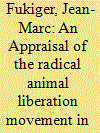

|
|
|
|
|
| Publication |
2008.
|
| Summary/Abstract |
February 2007, the Animal Liberation Front claimed responsibility for the arson of two trucks in the Italian-speaking part of Switzerland. After analyzing this event, which triggered an unusual media response in the country, this article assesses recent and past actions of the radical animal liberation movement in Switzerland for the period from 2003 to the end of March 2007. This article also presents some features of the non-radical animal liberation movement in the German-speaking and Italian-speaking parts of the country and demonstrates possible links between the non-radical movement and the radical one
|
|
|
|
|
|
|
|
|
|
|
|
|
|
|
|
| 5 |
ID:
173298
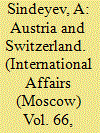

|
|
|
|
|
| Summary/Abstract |
THE WORLD ORDER is undergoing yet another transformation, and one whose result is hard to foresee.1 Europe is getting ready to get involved in rivalries among options for globalization, and this means it is again important for scholars to take up something that until recently was in danger of becoming a peripheral area of research - holistic studies of individual countries, including analysis of behavior models of smaller states and their desire and resources for relationships with larger actors.
|
|
|
|
|
|
|
|
|
|
|
|
|
|
|
|
| 6 |
ID:
172447
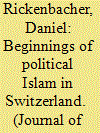

|
|
|
|
|
| Summary/Abstract |
When the Muslim Brotherhood (MB) was banned in Egypt in 1954, many of its followers and leaders found refuge and support in conservative Islamic countries, most notably in Saudi Arabia and Jordan. In the late 1950s, a Saudi diplomat approached the Swiss authorities with plans to open an Islamic Center in Geneva. From the beginning, the Swiss authorities welcomed the project, because it was supported by several pro-Western Arab countries, which opposed Egypt under Nasser. Swiss-Egyptian relations had been strained for some years because of Nasser’s socialist policies and Egypt’s espionage and propaganda operations in Switzerland. The Islamic Center eventually opened in 1960, and was headed by Said Ramadan, an exiled leader of the Muslim Brotherhood. Egyptian officials tried to thwart the Center’s activity and competed with it over influence on the small Arab student body then residing in Switzerland. As a politically active foreigner, the Swiss looked with suspicion on Ramadan. Still, they felt sympathy for his anti-Nasserist and anti-Communist stance, ignoring internal reports revealing the anti-Western and anti-Semitic nature upon his ideology. After 1966, the Swiss Ministry of Foreign Affairs believed Nasser’s Arab nationalism to be in terminal decline, expecting that Islamists might soon come to power in the Middle East. As a result, they decided to allow Ramadan and his family to remain in Switzerland despite overstaying their residence permits. This article sheds light on the founding years of the MB in Europe, a development still largely unchartered by historians, and the reaction of the Swiss to the appearance of a new phenomenon in Europe: political Islam. It argues that the context of Swiss-Egyptian relations is essential for understanding Swiss actions toward the Muslim Brotherhood.
|
|
|
|
|
|
|
|
|
|
|
|
|
|
|
|
| 7 |
ID:
098389
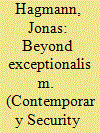

|
|
|
|
|
| Publication |
2010.
|
| Summary/Abstract |
Switzerland's traditional, military-centred and isolationist Cold War policies began to be vehemently contested in the 1990s. However, since the early 2000s, debates on security policy and foreign affairs have gradually lost public salience, and recent popular votes suggest increasingly consistent support both for a broader conception of national security and a more internationalist interpretation of neutrality. Have Switzerland's traditional policy frameworks thus been overcome? Investigating elite positions, this article argues that indeed, conventional disputes between military and civilian understandings of security have been transcended recently, as Swiss policy-makers settled for a remarkably broad and non-traditional conception of national security. At the same time, the article also argues, the perception of increasingly global security challenges has started to provide powerful rationales against traditional Swiss isolationism. By showing the processes through which Swiss security conceptions have been reformulated into a new dominant elite agreement, the article points out how Switzerland has slowly come to embrace security in European terms - not least also thanks to its new focus on non-traditional security agendas.
|
|
|
|
|
|
|
|
|
|
|
|
|
|
|
|
| 8 |
ID:
068778
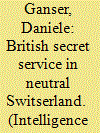

|
|
|
| 9 |
ID:
184522


|
|
|
|
|
| Summary/Abstract |
The relationship between digital technology and politics is an important phenomenon that remains poorly understood due to several structural problems. A key issue is the lack of adequate research infrastructures or the lack of access. This article discusses the challenges many social scientists face and presents the infrastructure we built in Switzerland to overcome them, using COVID-19 as an example. We conclude by discussing seven lessons we learned: automatization is key; avoid data hoarding; outsource some parts of the infrastructure but not others; focus on substantive questions; share data in the context of collaborations; engage in targeted public outreach; and collaboration is more promising than competition. We hope that our experience is helpful to other researchers pursuing similar goals.
|
|
|
|
|
|
|
|
|
|
|
|
|
|
|
|
| 10 |
ID:
119934


|
|
|
| 11 |
ID:
096399
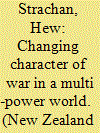

|
|
|
| 12 |
ID:
167330
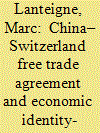

|
|
|
|
|
| Summary/Abstract |
The free trade agreement signed between China and Switzerland in 2013 was a watershed event in the economic policies of both states, a successful identity-building exercise for both actors in addition to an economic endeavour. In the case of Beijing, the Switzerland free trade agreement (FTA) was a crucial step not only in promoting its trade interests in Europe, including the European Union, but also in planning future FTAs and promoting China as a supporter of globalization and economic liberalisation. For Switzerland, the FTA further cemented that country’s identity as a distinct European economic and political actor, including in its engagement of the Chinese market.
|
|
|
|
|
|
|
|
|
|
|
|
|
|
|
|
| 13 |
ID:
132840
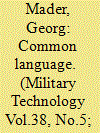

|
|
|
|
|
| Publication |
2014.
|
| Summary/Abstract |
Prior to Berlin's ILA Georg Mader takes a through look at updates and developments in the air arms of Austria, Germany and Switzerland.
|
|
|
|
|
|
|
|
|
|
|
|
|
|
|
|
| 14 |
ID:
107273
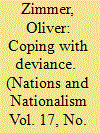

|
|
|
|
|
| Publication |
2011.
|
| Summary/Abstract |
This article highlights two processes that shaped Swiss nationhood in the long nineteenth century. The first concerns the competition between different nation-states and the nationalist visions these contests engendered. In a Europe dominated by the norm of the culturally and ethnically homogenous nation, the Swiss authorities, public intellectuals and various political representatives were desperate to display an image of national authenticity to the outside world. The result was a nationalism that combined voluntaristic and organic elements. In the second and main part of this article, the focus turns on citizenship; it is conceived not only as a social and legal institution, but also as a cognitive prism through which people defined their membership in the national community. Remarkably, the authority in granting national citizenship to foreign nationals remained firmly in the hands of the cantons and, above all, the Swiss municipalities. In practical terms, this meant that the Gemeinde provided the institutional and cognitive frame through which nationhood was primarily experienced, imagined and defined. While Switzerland represents a particularly strong case of a communalist polity, it should not be treated as unique. Instead, it should alert us to a potentially fertile yet little-explored area of research: what might be called the communal embededdness of the national(ist) imagination.
|
|
|
|
|
|
|
|
|
|
|
|
|
|
|
|
| 15 |
ID:
183586
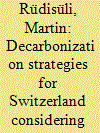

|
|
|
|
|
| Summary/Abstract |
Decarbonizing the energy system by electrification of heat and transport is only effective when using low-carbon electricity sources. As many countries such as Switzerland rely on imported electricity to meet their demand, the greenhouse gas (GHG) content of electricity imports must be correctly accounted for. By assuming an average GHG content for each amount imported, impacts of electricity required in peak periods are underestimated because additional (marginal) demand is primarily met with fossil power plants. This study employs a model to capture marginal GHG contents of imported electricity from a direct and indirect (life-cycle) perspective at an hourly resolution. Implications on GHG are explored for various electricity demand and supply scenarios including electrification of heat and transport, large-scale expansion of renewables, and nuclear phase-out. We find that depending on the scenario, the average GHG intensity of consumed electricity may double, while diurnal and seasonal variations are even larger. Nonetheless, results show substantial GHG mitigation of up to 45% with electrification in case of deploying a diversified electricity generation portfolio including photovoltaics and wind. For optimal GHG mitigation, short-term flexibility as provided by hydropower is necessary to manage electricity surpluses. The main challenge, however, surrounds seasonal energy storage including sector coupling.
|
|
|
|
|
|
|
|
|
|
|
|
|
|
|
|
| 16 |
ID:
171375
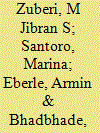

|
|
|
|
|
| Summary/Abstract |
While quantitative methods for tracking the evolution of energy efficiency (EE) in industry do exist, these cannot always be directly applied, mainly due to lack of data on physical activity levels, as encountered in Switzerland. Therefore, a bottom-up method is developed and tested for estimating the sectoral physical activity levels in Switzerland. On this basis, sector-specific EE indices are determined. The results show that during the period 2009–2016, EE improved most in the paper sector (3.3% p.a.), followed by minerals (2.3% p.a.) and food (1.6% p.a.) sectors while the levels have remained approximately unchanged in chemical and metal sectors. Furthermore, the annual change in final energy demand was decomposed into changes of physical production, price levels and EE. The analysis concluded that only the food sector performed well according to all performance indicators. The detailed analysis of the Swiss target agreements’ data has revealed major final energy savings in chemical and food sectors during the period 2000–2016. Among the different categories of EE measures, process related measures have proven to yield the highest energy savings across all sectors. The results indicate the successful implementation of EE measures in Swiss industry, favored by the relatively strict Swiss regulatory framework and its target agreement mechanism.
|
|
|
|
|
|
|
|
|
|
|
|
|
|
|
|
| 17 |
ID:
091726
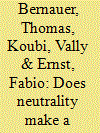

|
|
|
| 18 |
ID:
094988
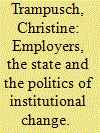

|
|
|
|
|
| Publication |
2010.
|
| Summary/Abstract |
An in-depth comparison of Austria, Germany and Switzerland shows that the employers' constellation and the elites of the public education administration affect patterns of institutional change. If large firms are the dominant actors and collaborate with elites in the public education administration, institutional change follows a transformative pattern. If small and medium-sized firms are in a strong position and have the power to influence public elites according to their interests, self-preserving institutional change results. The article also shows that it is not so much trade unions as small and medium-sized firms that act as a brake on transformative change. The article adds to the literature of institutional change by arguing that specifying and explaining patterns of institutional change requires that sufficient scope be allowed for actors' creative handling of institutions. It also suggests that in order to differentiate between self-preserving and transformative change, one has to specify the important institutional dimensions that sustain an institution. The article combines Mill's method of agreement and difference.
|
|
|
|
|
|
|
|
|
|
|
|
|
|
|
|
| 19 |
ID:
150679
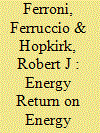

|
|
|
|
|
| Summary/Abstract |
Many people believe renewable energy sources to be capable of substituting fossil or nuclear energy. However there exist very few scientifically sound studies, which apply due diligence to substantiating this impression. In the present paper, the case of photovoltaic power sources in regions of moderate insolation is analysed critically by using the concept of Energy Return on Energy Invested (ERoEI, also called EROI). But the methodology for calculating the ERoEI differs greatly from author-to-author. The main differences between solar PV Systems are between the current ERoEI and what is called the extended ERoEI (ERoEI EXT). The current methodology recommended by the International Energy Agency is not strictly applicable for comparing photovoltaic (PV) power generation with other systems. The main reasons are due to the fact that on one hand, solar electricity is very material-intensive, labour-intensive and capital-intensive and on the other hand the solar radiation exhibits a rather low power density.
|
|
|
|
|
|
|
|
|
|
|
|
|
|
|
|
| 20 |
ID:
020358
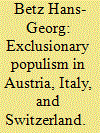

|
|
|
|
|
| Publication |
Summer 2001.
|
| Description |
393-420
|
|
|
|
|
|
|
|
|
|
|
|
|
|
|
|
|
|
|
|
|